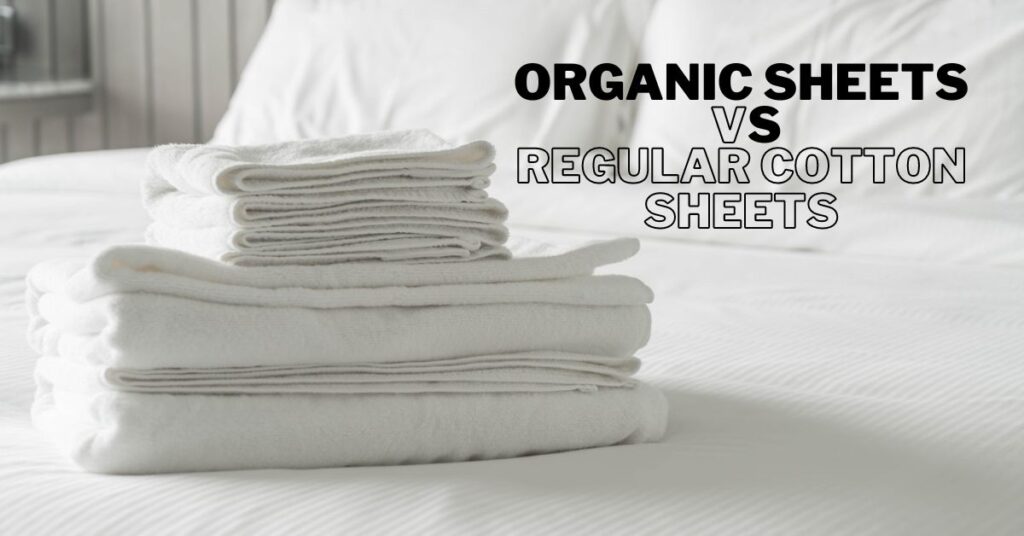Our general health and well-being depend on getting a good night’s sleep, and having the appropriate bedding is key to achieving this goal. There are many options accessible on the market when it comes to selecting bedding. Among them, organic sheets are becoming more and more popular because of their alleged health advantages and minimal environmental impact. In contrast, many people have traditionally preferred normal cotton sheets, particularly well-liked selections like black Egyptian cotton bedding. We’ll examine the differences between these two types of bedding in this post, illuminating the material, manufacturing process, advantages, and environmental effects.
Composition of Materials
Biological Sheets:
Organic cotton is farmed without the use of synthetic pesticides, herbicides, or genetically modified organisms (GMOs) and is used to make sheets. Instead, organic cotton is grown utilising organic farming methods that maintain soil health and reduce environmental impacts, like crop rotation and the employment of helpful insects. Because of this, consumers looking for bedding free of hazardous chemicals select organic cotton sheets.
Regular Cotton Sheets:
On the other hand, regular cotton sheets are often produced from cotton that has been grown conventionally. These cotton crops frequently rely heavily on synthetic fertilisers and pesticides, which may leave chemical residues on the fabric and harm the environment. Traditional cotton sheets could be more widely available and less expensive. But they might also be risky for your health and the environment.
Production Method
Biological Sheets:
Organic sheets are produced by rigorous standards and certifications. Organic cotton is grown with an emphasis on ecological responsibility and sustainability. Farming without synthetic chemicals helps maintain healthy soil and lowers water pollution. In addition, processing organic cotton usually doesn’t involve any harsh chemicals and instead relies on techniques that are safer for both employees and customers.
Regular Cotton Sheets:
Synthetic chemicals are used in conventional cotton growing and processing, which can be harmful to the environment and human health. The contamination of soil, water, and air by pesticides and fertilisers can result in several environmental issues. In addition, harsh chemicals like formaldehyde and chlorine bleach are frequently used in the processing of ordinary cotton, which can leave residue on the fabric and potentially irritate people with sensitive skin.
Benefits to Health and Comfort
Biological Sheets:
Numerous comfort and health advantages can be attained by using organic bedding. Organic sheets are less prone to cause allergies or skin sensitivities because they are free of chemical residues. The cloth is typically softer and more comfortable on the skin due to the lack of harsh processing chemicals. The well-being of agricultural workers and nearby communities may also benefit from the sustainable farming methods connected with organic cotton.
Regular Cotton Sheets:
While regular cotton sheets can be cosy, there is a chance that chemical residues from processing and cultivation may be present. When using traditional cotton sheets, people with sensitive skin or allergies may feel pain or irritability. Additionally, customers who practice responsible consumption may have worries about the effects that conventional cotton cultivation has on the environment and their health.
Impact on the Environment
Biological Sheets:
Sheets made of organic materials are said to be more environmentally friendly. Organic cotton production has a lower carbon footprint thanks to the sustainable farming methods utilised in its cultivation. Additionally, organic cotton production often uses less water than conventional methods, which can be an important consideration in areas with a shortage of water. Making the switch to organic sheets can promote a more environmentally friendly and sustainable way of life.
Regular Cotton Sheets:
Traditional cotton production is frequently criticised for its reliance on synthetic pesticides, high water use, and land deterioration. Soil erosion, water pollution, and impairment of regional ecosystems can all be side effects of conventional cotton farming. Customers may unintentionally support practices that are unsustainable and harmful to the environment by choosing standard cotton bedding.
Overall Excellence
Organic sheets and normal cotton sheets differ in several ways in terms of quality. Due to the absence of chemical treatments, organic sheets tend to feel softer and more opulent. While pleasant, traditional cotton sheets can start with a starchy or stiff feel that may take several washings to soften. Furthermore, organic sheets are strong and won’t lose their quality even after being washed numerous times and put to frequent use. They are frequently constructed with tighter weaves, and greater thread counts to ensure a long-lasting and robust product. Despite being available in a range of thread counts, conventional cotton sheets may not last as long because of the usage of chemicals in the manufacturing process.
Credentials and Labels
When buying bedding, search for certificates and labels that attest to the sheets’ organic status to make well-informed decisions. Organic textiles, including sheets, can be certified by groups like the Global Organic Textile Standard (GOTS) and the Organic Content Standard (OCS). These marks guarantee that the item satisfies particular organic and environmental standards.
Conclusion:
Choosing between organic sheets and normal cotton sheets can have a big impact on your quest for a restful night’s sleep and a sustainable lifestyle. In addition to being devoid of dangerous chemicals, organic sheets also support farming methods that are good for the environment. Regular cotton sheets have possible health and environmental risks despite being more widely available and less expensive.
Also, read: 7 Fabrics and Materials to Elevate Your Home’s Style

